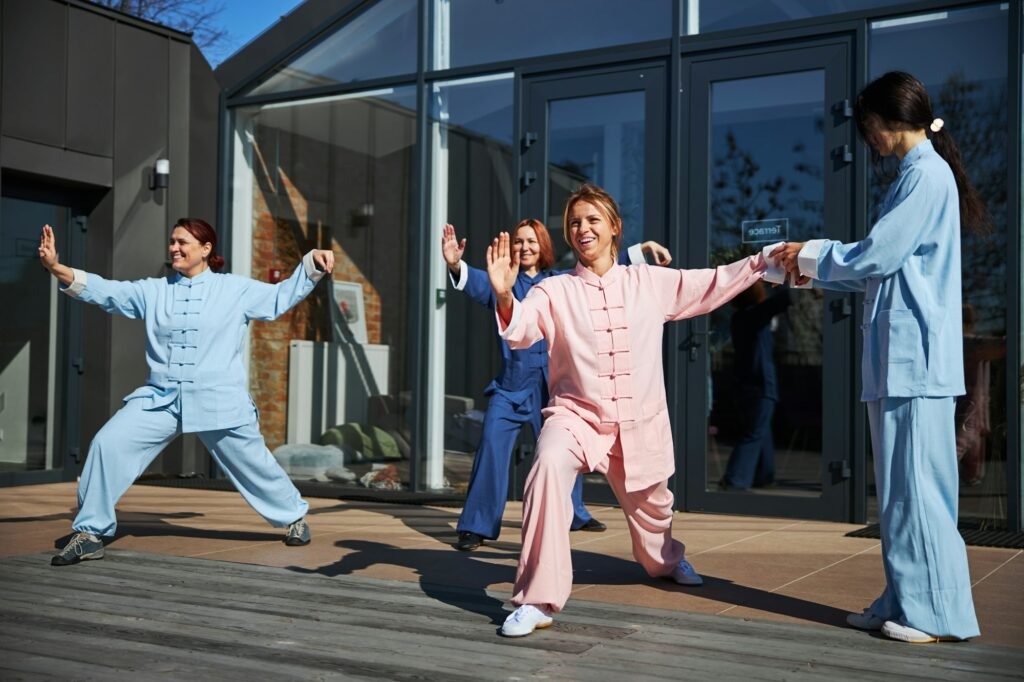Qi Gong

Qi Gong
Qi Gong, an ancient Chinese healing practice, stands as a pillar of traditional Chinese medicine. It centers on cultivating and optimizing the flow of “qi,” the vital life force energy that animates the body and mind. In the realm of holistic wellness, Qi Gong is revered for its ability to enhance physical health, mental well-being, and overall energetic balance within the individual.
What is Qi Gong?
The term “Qi Gong” can be translated as “energy work” or “energy cultivation.” Qi Gong involves a harmonious blend of three core elements:
- Gentle Movement: Slow, flowing movements and postures designed to enhance energy circulation.
- Breathwork (Pranayama): Controlled breathing patterns to cultivate qi and promote relaxation.
- Mindfulness: Focused attention on the present moment, sensations within the body, and the flow of energy.
How Can Qi Gong Help You?
Qi Gong offers a pathway to well-being through several mechanisms:
- Stress Reduction: Qi Gong promotes a deep relaxation response, countering stress and its negative effects on the body. Chronic stress can lead to a cascade of physiological changes, including the release of stress hormones like cortisol. These hormones can impair digestion, weaken the immune system, and contribute to anxiety and depression. Qi Gong’s focus on slow, mindful movements and deep breathing activates the parasympathetic nervous system, the body’s rest-and-digest response. This counteracts the fight-or-flight response triggered by stress, promoting relaxation, lowering blood pressure, and reducing muscle tension.
- Improved Energy Levels: Optimizing qi flow combats fatigue and enhances vitality. Traditional Chinese medicine believes that sluggish or blocked qi can manifest as fatigue and low energy. Qi Gong practices stimulate the flow of qi throughout the body, promoting a sense of rejuvenation and physical vitality. Additionally, the deep breathing exercises characteristic of Qi Gong increase oxygen intake and improve circulation, further contributing to enhanced energy levels.
- Pain Management: Qi Gong can alleviate chronic pain through improved energy circulation and relaxation techniques. Chronic pain can significantly impact quality of life, and conventional pain management strategies often rely on medication with potential side effects. Qi Gong offers a non-invasive approach to pain management. By improving qi circulation, Qi Gong can reduce inflammation and promote healing in areas of discomfort. Furthermore, the relaxation techniques incorporated into Qi Gong practice help reduce muscle tension and improve pain tolerance.
- Mental Clarity: Focus on breath and mindful movement promotes mental focus and calmness. In today’s fast-paced world, mental clarity and focus are essential for optimal cognitive function. Qi Gong’s emphasis on mindful movement and breathwork cultivates a state of present-moment awareness, quieting the mind and reducing mental chatter. This enhanced focus translates into improved concentration, memory, and cognitive performance.
- Holistic Balance: Qi Gong addresses the interconnectedness of mind, body, and spirit for holistic health. Traditional Chinese medicine views health as a state of harmony between the physical, mental, and spiritual aspects of being. Qi Gong practices integrate movement, breathwork, and meditation, fostering balance and connection between these aspects. This holistic approach promotes overall well-being and resilience in the face of life’s challenges.
What is Qi Gong Good For?
Qi Gong has applications in addressing a vast array of both physical and mental health conditions. Some specific benefits include:
- Managing Chronic Conditions: Helps improve symptoms of arthritis, fibromyalgia, and high blood pressure.
- Reducing Anxiety and Depression: Offers complementary support for managing anxiety and depression.
- Boosting Immunity: Qi Gong strengthens the immune system and promotes resilience.
- Enhancing Sleep: Cultivates deep relaxation and improves sleep quality. Cultivating Inner Peace: Develops a sense of inner peace and well-being.
Benefits of Qi Gong
Practicing Qi Gong leads to numerous benefits including:
- Physical Health Improvements: Increased flexibility, improved strength, and reduced chronic pain.
- Mental Well-being: Reduced stress, enhanced mood, and greater emotional stability.
- Energetic Balance: Improved energy circulation and greater vitality.
- Spiritual Connection: Qi Gong facilitates a deeper connection to the self and the natural world.
- Enhanced Self-awareness: Cultivates mindful awareness and improved mind-body connection.
What to Expect from Qi Gong with a Practitioner
Qi Gong sessions may be offered in a group setting or one-on-one with a qualified instructor. Typical sessions consist of the following elements:
- Warm-up: Gentle movements and stretches prepare the body for Qi Gong practice.
- Guided Qi Gong Forms: Instructors lead participants through specific movements, breathing, and visualizations.
- Meditation: A period of guided or silent meditation for calming the mind and cultivating internal awareness.
- Cool-down: Gentle movements and stretches to conclude the session.
Similar Modalities to Qi Gong
Other modalities that share similarities with Qi Gong’s focus on energy cultivation and mind-body integration include:
- Tai Chi: A flowing movement practice with roots in Chinese martial arts.
- Yoga: Ancient Indian practice that harmonizes breathing, postures (asanas), and meditation.
- Mindfulness Practices: Mind-body techniques focused on cultivating present-moment awareness.
Final Thoughts
Qi Gong stands as a powerful tool for cultivating holistic well-being. Its gentle nature and adaptability make it accessible to individuals of all ages and fitness levels. By harmonizing the body, mind, and spirit, Qi Gong promotes healing, inner peace, and a heightened sense of vitality. If you seek ways to improve your health, manage stress, and enhance your overall well-being, exploring the ancient wisdom of Qi Gong offers a journey towards profound transformation.
Scientific References
- Jahnke, R., Larkey, L., Rogers, C., Etnier, J., & Lin, F. (2010). A comprehensive review of health benefits of qigong and tai chi. American Journal of Health Promotion, 24(6), e1-e25. doi: 10.4278/ajhp.081013-LIT-248
- Lee, M. S., Pittler, M. H., & Ernst, E. (2007). Qigong for hypertension: A systematic review of randomized clinical trials. Journal of Hypertension, 25(8), 1525-1532. doi:10.1097/HJH.0b013e328162f863
- Oh, B., Butow, P., Mullan, B., & Clarke, S. (2019). The impact of medical qigong on quality of life, fatigue, mood and inflammation in cancer patients: A randomized controlled trial. European Journal of Integrative Medicine, 1(2), 30-37.
Recommended Reading
- Cohen, Kenneth S. (1999). The Way of Qigong: The Art and Science of Chinese Energy Healing. Random House.
- Jahnke, Roger. (2014). The Healer Within: Using Traditional Chinese Techniques to Release Your Body’s Own Medicine. HarperOne.
- Yang, Jwing-Ming. (2003). Qigong for Health & Martial Arts: Energy Workouts for Strength,Stamina & Flexibility. YMAA Publication Center.
FAQ: Qi Gong
Is Qi Gong difficult to learn?
Qi Gong is known for its accessibility. There are many beginner-friendly forms, and individuals of all fitness levels can find a style of Qi Gong that suits them. Qualified instructors provide guidance and modifications as needed.
Can I practice Qi Gong at home?
Absolutely! While learning from a qualified instructor is recommended initially, many resources are available for home practice. These include instructional videos, books, and online courses.
How often should I practice Qi Gong?
Consistency is key for reaping the benefits of Qi Gong. Aiming for a regular practice, even short daily sessions of 10-15 minutes, can yield noticeable results.
Are there any side effects to Qi Gong?
Qi Gong is generally considered very safe. However, consulting your doctor before starting is always advisable, particularly if you have any pre-existing health conditions.
Can Qi Gong replace conventional medicine?
Qi Gong should not replace conventional medical consultations or prescribed treatments. Instead, consider it a valuable complementary practice that can enhance the effectiveness of conventional medicine and promote overall well-being.
Related Practitioners
Helena Fleming B.A., M.A. LIC I.S.H, RHOM
HOMEOPATHY & BIORESONANCE
- 3 Meadowbrook, Tulsk, Co. Roscommon, F45 FH97, Ireland
- (678) 210-5270
I am a homeopath and bioresonance practitioner with 27 years experience. I combine a classical approach to homeopathy with state-of-the-art… Read More





















